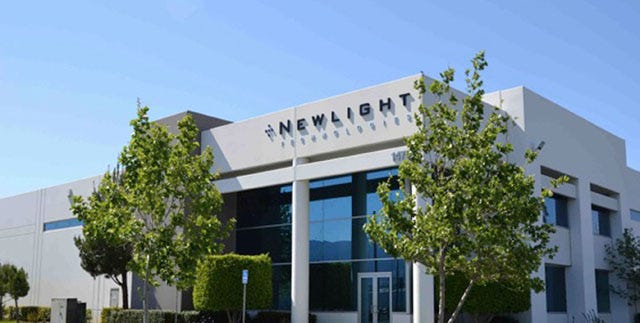Newlight Technologies LLC was unknown to almost everyone in the audience at the nova-Institute's recent biotechnology event until it became the first American company to win top honors in what is fast becoming a highly coveted distinction in the world of bioplastics.
April 30, 2013
Newlight Technologies LLC was unknown to almost everyone in the audience at the nova-Institute's recent biotechnology event until it became the first American company to win top honors in what is fast becoming a highly coveted distinction in the world of bioplastics.
The California-based company became the 6th winner of the annual Biomaterial of the Year - Innovation Award earlier this month in Cologne, Germany. Since 2008, the award, an initiative of the German independent research institute nova-Institut, has been presented to companies developing innovative bioplastics and technologies with practical applications.
Greenhouse gas based plastics on a commodity scale
In his presentation, Newlight Technologies co-founder and CEO Mark Herrema wasted no time in bringing his audience up to speed on what Newlight Technologies was up to. "Our mission is to replace oil-based plastics with greenhouse gas-based plastics on a commodity scale. Our founding idea was taking greenhouse gasses and turning them into plastic. We thought, maybe plastics can be part of the solution to the build-up of CO2 in the atmosphere. We saw this as a platform to fix the problem: we could take carbon emissions and turn them into material. We recognized that to do this at volume, we would need to out-compete oil-based plastics on price and performance.
Thus Newlight Technologies was born: a company founded out of Princeton University and Northwestern University in 2003 by Mark Herrema and Kenton Kimmel, who soon discovered that what they were trying to do had been tried before - without success. "We spent the next 10 years trying to get the cost of production down," said Herrema. "Today, 10 years, 10 patents and millions of dollars in R & D later, and with breakthroughs in yield and performance, we've figured it out."
Proprietary biocatalyst is key
The company has developed a proprietary biocatalyst to convert air and greenhouse gases, such as methane and carbon dioxide, into PHA-based plastics at very high yield. Newlight's conversion technology can synthesize high-performance thermoplastics from a wide range of sources, including methane and/or carbon dioxide from wastewater treatment facilities, landfills, anaerobic digesters, or energy facilities - at scale.
Newlight Technologies LLC |
Newlight Technologies is headquartered in Irvine, CA. |
So, how did they do it? "The critical breakthrough came when we discovered there was a control switch that deactivated the catalyst. We found out how to turn it off, and the impact was dramatic - immediately, a 500% increase in yield performance compared to before," explained Herrema.
For the first time, here was a process that could out-compete oil-based commodity plastics on price, performance, and sustainability.
"People ask us what kind of PHA we make," said Herrema. "I tell them: the cost effective kind!"
A new PHA
Newlight's Airflex (mPHA), also called AirCarbon, is a family of high-performance thermoplastic resins that, according to the company can be produced as a carbon-negative thermoplastic material, "quantifiably reducing the amount of carbon released into the air in every pound of plastic we make." These PHAs, which are available in various grades, can be used in applications where (impact) polypropylene, polyethylene, ABS, or TPU would traditionally be used. Newlight currently has 12.5 million lb of resin executed under LOI.
"We now have a market-driven tool to capture carbon," said Herrema as he ended. "We've reduced cost and maintained performance. Our product has the potential to compete directly with some major chemically produced polymers. We can change the world. It's here, it's now - and it's happening as we speak."
About the Author(s)
You May Also Like



